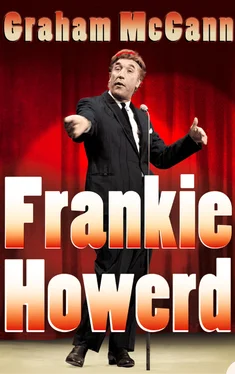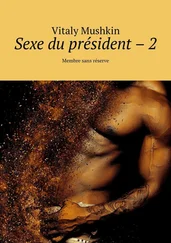What he did was to make the audience â via the use of a remarkably wide range of verbal idiosyncrasies in his delivery â hear the sort of meanings in certain innocent words that no English dictionary would ever confirm. âTo say âIâm going to do you,ââ he later explained by way of an example, âwas considered very naughty, yet I got away with the catchphrase: âThere are those among us tonight whom I shall do-o-o-oâ.â Howerd would also respond more censoriously than the censors whenever one of his stooges, such as the showâs band leader Billy Ternent, made a supposedly ambiguous remark: âHeâd say something like: âIâve just been orchestrated,â and Iâd reply: âDirty old devil!ââ 10
It all added up to a real mastery of the medium. Howerdâs performances improved, and his popularity began, once again, to increase. The early crisis in his radio career was over.
As if to acknowledge this fact, the next BBC Year Book , in an article that hailed radio comedyâs coming of age, included Howerd in an elite group of young British performers who had now earned the right to be considered âtrue men of broadcastingâ. 11 The turnaround was also recognised by the producers of variety Bandbox , who responded to Howerdâs soaring appreciation figures by promptly adding to the amount of airtime they apportioned to his act.
Howerd himself, however, was in no mood to rest on his laurels. He knew that he still needed â and now more urgently than ever â to find a way to start improving the quality of his scripts.
By this stage, he had started buying a few scraps of comic material from a man named Dink Eldridge. Each week, a sheet of about twenty or so one-liners would arrive from Eldridge, and Howerd would study them, pick the one that sounded least like it had been transcribed from short-wave radio, and then proceed to stretch it out into a full-length routine. It was not an arrangement that could be allowed to continue. With more time to fill, and his first summer season coming up in Clacton, it was obvious that he needed to hire a proper, full-time comedy writer.
By now, he could just about afford it. For the Fun of It may recently have finished, but he was now earning a sum (£20 per show) from radio that for the time was a reasonable wage (equivalent to about £500 in 2004), and he was ready to invest some of it in his act. Finding an available writer blessed with both the right type and degree of ability, however, was another matter, and Howerd spent much of the rest of 1947 trying in vain to track him down.
Finally, at the end of November, shortly before he travelled up to the Lyceum Theatre in Sheffield to star (as Simple Simon) in the pantomime Jack and the Beanstalk , he came up with a suitable candidate. Casting his mind back to his days touring Germany with The Waggoners shortly after the end of the war, he recalled seeing â and admiring â a young fellow-comedian who was appearing in Schleswig-Holstein at the time in another CSE revue entitled Strictly Off the Record .
The comedianâs name was Eric Sykes. Aged twenty-four, from Oldham in Lancashire, he was now struggling to make a living as a straight actor in repertory at Warminster. He was still, however, hopeful of one day resuming his comedy career (as a performer rather than a writer), and took great delight in tuning in his wireless each fortnight to catch the latest broadcast by one of his great contemporary heroes, a stand-up comic who, coincidentally, happened to be none other than Frankie Howerd.
After making a number of casual enquiries, Howerd found that he and Sykes had a mutual friend: the comedian Vic Gordon. When Gordon called Sykes to tell him how keen Howerd was for the two of them to meet up, Sykes could not have felt more thrilled: âIt was as if,â he recalled, âthe King had contacted me for a game of skittles at Buckingham Palace.â 12 He did not actually know what Howerd looked like â he only knew the sound of his extraordinary voice and the âsheer brillianceâ of his special brand of âhappy nonsenseâ â but Gordon provided him with a suitably vivid description and then advised him to arrange to visit the star as soon as possible.
A few days later, an excited Sykes travelled by train to Sheffield, and made his way to the Lyceum Theatre. There, in a dressing-room backstage, he set eyes on Frankie Howerd for the first time. He was more than slightly taken aback when Howerd started to explain how much he had admired the material Sykes had written during the war â because Sykes knew that he had not written any material during the war. The act that Howerd so warmly recalled had in fact been built from second-hand material culled from American shows on short-wave radio â just like Howerdâs had. When Sykes pointed this out, he was rather surprised â and very pleased and relieved â to find that his hero still seemed interested in finding a way to use him on the show: âHe said, âDo you think that you could write for me?â Well, Iâd never written anything for anyone in my life! So I said, âWell, er, no doubt: when do you want it?â And he said, âEight days from now.â So I said, âAll right, hang on a minute, have you got a bit of paper?â And then he went out to do the matinée performance of the pantomime, and by the time he came back at the end Iâd written his first script.â 13 A new partnership had begun.
It proved, almost immediately, a near-perfect union. Both men had always gravitated towards the kind of comedy that came from character rather than gags; both of them had lived through the absurdities of war and then come to terms with the uncertainties of peace; both of them had an affinity for the routine experiences of ordinary working people; and both of them seized on any chance to cock a snook at pretension and pomposity.
Конец ознакомительного фрагмента.
Текст предоставлен ООО «ЛитРес».
Прочитайте эту книгу целиком, купив полную легальную версию на ЛитРес.
Безопасно оплатить книгу можно банковской картой Visa, MasterCard, Maestro, со счета мобильного телефона, с платежного терминала, в салоне МТС или Связной, через PayPal, WebMoney, Яндекс.Деньги, QIWI Кошелек, бонусными картами или другим удобным Вам способом.












